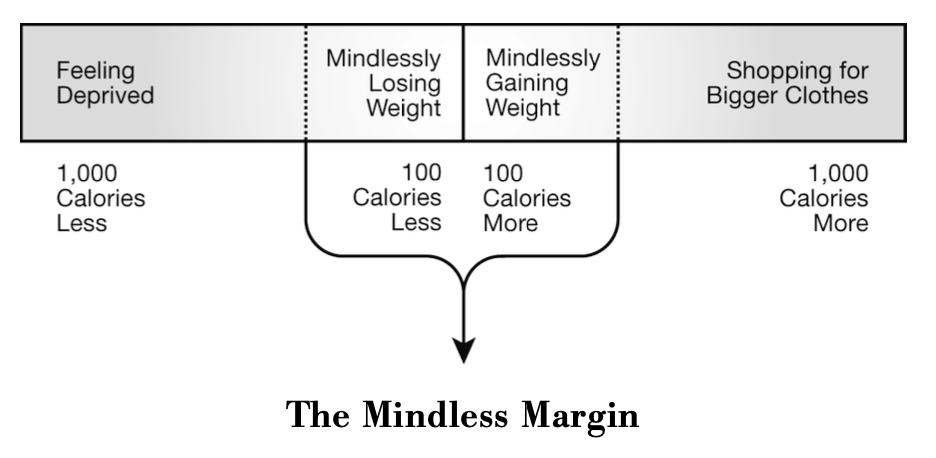|
No one goes to bed skinny and wakes up fat. Most people gain (or lose) weight so gradually they cannot really figure out how it happened. They do not remember changing their eating or exercise patterns. All they remember is once being able to fit into their favorite pants without having to hold their breathe and hope they can get the zipper to budge.
Sure, there are exceptions. If we gorge ourselves at the all-you-can-eat pizza buffet, then clean out the chip bowl at the Superbowl party, then stop by the Baskin-Robbins drive-through for a “Belly Buster” Sundae on the way home, we realize we have gone too far over the top. But on most days we have very little idea whether we have eaten 50 calories too much or 50 calories too little. In fact, most of us would not know if we ate 200 or 300 calories more or less than the day before. This is the Mindless Margin. It is the margin or the zone in which we can either slightly overeat or slightly undereat without being aware of it. Suppose you can eat 2000 calories a day without either gaining or losing weight. If one day, however, you only ate 1000 calories, you would know it. You would feel weak, light-headed, cranky, and you would snap at the dog. On the other hand you would also know it if you ate 3000 calories. You would feel a little heavier, slower, and more like flopping on the couch and petting the cat. If we eat way too little, we know it. If we eat way too much, we know it. But there is a calorie range – a Mindless Margin– where we feel fine and are unaware of small differences. That is, the difference between 1900 calories and 2000 calories is one we cannot detect, nor can we detect the difference between 2000 and 2100 calories. But over the course of a year, this mindless margin would either cause us to lose ten pounds or to gain ten pounds. It takes 3500 extra calories to equal one pound. It does not matter if we eat these extra 3500 calories in one week or gradually over the entire year. They will all add up to one pound. This is the danger of creeping calories. Just 10 extra calories a day – 1 stick of Double-mint gum or 3 small Jelly Belly jelly beans – will make you a pound more portly one year from today. Only three Jelly Bellies a day. Fortunately, the same thing happens in the opposite direction. One colleague of mine, Stacy, had lost around 25 pounds during her first two years at a new job. When I asked how she lost the weight, she could not really answer. After some persistent questioning, it seemed that the only deliberate change she had made two years earlier was to give up caffeine. She switched from coffee to herbal tea. That did not seem to explain anything. “Oh, yeah,” she said, “And because I gave up caffeine, I also stopped drinking Coke.” She had been drinking about six cans a week – far from a serious habit – but the 139 calories in each Coke translated into 14 pounds a year. When she quit, she was not even aware of why she had lost weight. In her mind all she had done was cut out caffeine. Herein lies the secret of the Mindless Margin. This Mindless Margin is that small range where we make slight changes to our routine that we hardly notice. Nevertheless, these changes can have a gradual – but eventually big – impact on our weight. They can make the difference between being 10 pounds heavier next New Years Day or 10 pounds lighter. Cutting out our favorite foods is a bad idea. Cutting down on how much we eat is mindlessly doable. Many fad diets focus more on the typesof foods we can eat rather than how much we should eat. The problem is not that we order beef instead of a low-fat chicken breast. The problem is that the beef is often twice the size. A low-fat chicken breast that we resent having to eat is no better for our long-term diet than a tastier but slightly smaller piece of beef. If we are looking at only a 100 or 200 calories difference a day, these are not calories we will miss. We can trim them out of our day relatively easy – and unknowingly. The key is to do it unknowingly – mindlessly. It is so much easier to rearrange your kitchen and change a few eating habits so you do not have to think about eating less or differently. This is the silver lining to this dark, cloudy sky. The same things that lead us to mindlessly gain weight can also help us mindlessly lose weight.
2 Comments
Nancy
1/28/2023 09:28:31 am
in this about Stacy losing weight by eliminating coke from her daily calorie intake, wouldn’t all other foods and exercise have to be exactly the same each day to prove this?
Reply
Brian
2/18/2023 07:12:05 am
Great question, Nancy, and you are exactly right. The reason that this woman lost this weight was that she drank one less Coke and didn't substitute it with anything else with the same amount of calories (maybe she drank water, for instance).
Reply
Leave a Reply. |
Welcome!Here are some tips, tricks, and secrets on how you and your family can eat to be healthier and happier. They're based on over 30 years of our published research.
Fun InterviewsMost Visited Last Month• For You
• Smarter Lunchrooms • The X'Plozionz Band • Help your family • Kitchen Scorecard • Retracted papers • Grocery secrets • Do kids inherit taste? • Be healthier at work • How not to retire • Estimating calories • Restaurant Secrets • Syllabus template Top 2024 Downloads• Kitchen Makeover
• Smarter Lunchrooms • Smarter Lunchroom Scorecard • Grocery Shopping Hacks • Restaurant Secrets • Write a Useful Syllabus • Workplace Wellness Tips • Healthy Profitable Menus Categories
All
|





 RSS Feed
RSS Feed